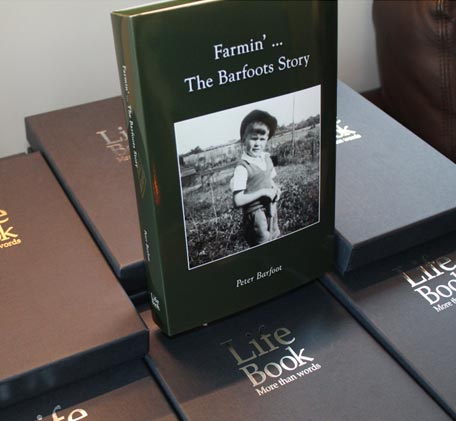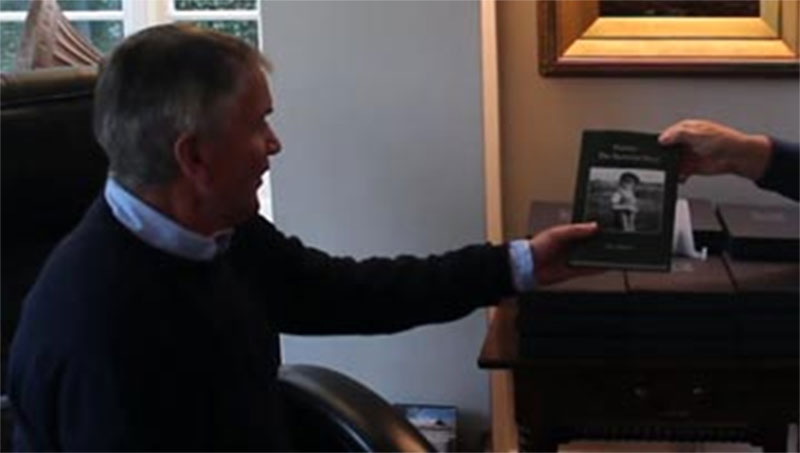The following testimonial is an extract from Farmin’ … The Barfoots Story
For my 66th birthday gift, Angela gave me an introduction to LifeBook. LifeBook is the brainchild of Roy Moëd. It is an attempt to capture your story so far, and to record memories of your life journey and family history for future generations. You are presented with a package explaining the whole process, which includes a personal interviewer and a professional writer to capture your stories and create an autobiography to share with family and friends.

When Peter completed his autobiography, he visited us for a celebratory presentation
I accepted the gift with gratitude, stuck it in a drawer, and got on with my very selfish existence, not giving it another thought. Not a month further on, I was in a coma in the neurological critical care unit at Brighton’s Royal Sussex Hospital, having suffered a massive subarachnoid hemorrhage and I was not expected to live much longer.
The Road to Recovery

Peter’s autobiography Farmin’ … The Barfoots Story
The fact that I did is down to Angela, an incredibly gifted brain surgeon Sanjay and the supervising ‘God’, Mr Norris, together with the whole army of NHS staff and support facilities which we all take for granted in our lives – not forgetting, most importantly, the paramedics and air ambulance crew who got me there alive in the first place. Air ambulance, by the way, only runs and exists through charitable donations.
Fast forward three months, I was not only alive but on my way home. Angela, meanwhile, had enlisted the help of Hobbs, a specialist neurological rehabilitation company. Their job? To get me back on the road ASAP.
The Hobbs team included a neuro-physiotherapist, speech and language therapist, occupational health therapist, and psychologist (I soon got rid of her!). I had a paralyzed throat and had to learn to speak and swallow again. My sense of balance was not too good either and I had to teach myself once more the cognitive skills we take for granted.
The LifeBook Journey

From author to LifeBook’s owner, all of his team were their to celebrate the completion of his journey.
It wasn’t long before my LifeBook present came out from the drawer. Alicia Denny, my interviewer, turned up, and away we went. It was not at all easy to begin with. My writing was not good, as it sloped downhill and was very spidery. I would speak into a recorder, but my voice would tire and I pronounced the words with difficulty, then I would have a coughing attack. Nevertheless, Alicia would bear with me, dragging out the memories. Because of my difficulties, I would dread her coming and the timetable slackened off.
Fortunately, she persisted with me and gradually the book gathered momentum and a life of its own. I took over the writing and production myself, using an iPad and emailing the chapters through to Alicia. I recruited a genealogist, Jeanette, whose research has added a new dimension. Angela has become a proofreader and my secretary.
Writing this book, I believe, has possibly been the biggest factor of my rehabilitation. It got my brain going again. Sometimes, after a big session of writing, my brain felt like scrambled egg for the whole of the following day.
It has joined the history of the past with the present and, hopefully, the future.
It is always your project; managed and created in a way you feel most comfortable

Peter and Roy shaking hands.
It was amazing to see the work Mr. Barfoot put into his LifeBook project by way of supporting his rehabilitation. A LifeBook project doesn’t usually require that level of effort from its author, but, as in Mr Barfoot’s case, we are more than happy to accommodate each individual author’s requirements to produce a private autobiography they can be proud of.
The closing statement of Mr. Barfoot’s book is an encouragement to assist the service which responded so quickly when he unfortunately had his accident.
If you would like to help the Kent, Surrey and Sussex Air Ambulance service be there for more people in their time of need, you can donate here.
Mr Barfoot’s Life story is being featured in the spring Hurlingham Polo Club magazine. The full article is below:
Larger Than Life
When a polo fall almost ended Peter Barfoot’s life, writing his autobiography helped set him on the road to recovery
Hampshire businessman Peter Barfoot’s love of horses can be traced back to his youth when he rode in the New Forest near his home village of Botley and, later, as joint master of the New Forest Buckhounds, but it was polo that became his true vocation. It was also polo that was to change his life dramatically.

Peter with first sweetcorn crop from Spain.
Peter’s introduction to the game came by chance when the president of the New Forest Polo Club Jack Broughton suggested “come along on your hunters and join in”. The line was cast and Peter was quickly hooked and reeled in.
Peter soon realized, if he was going to play seriously, he needed some lessons. On his ex-racehorse and expert polo pony Maui and under the watchful eye of trainer Paul Dukes, Peter made rapid progress. By this point, Peter was in his 40s, and for him, polo offered the chance to play, at top level, a high-adrenaline sport unencumbered by what would be considered advancing years in most other games.
Peter’s playing went from strength to strength as did his passion. He acquired a string of ponies, moved up the rankings and found himself playing both in the UK and across the world. His polo career culminated in his appointment as chairman of Cowdray Park Polo Club and the establishment of the successful Maiz Dulce team, the name a reference to the sweetcorn produced by Peter’s business.
Like most polo players, Peter took a few knocks, but it was a fall in 2016 that was to leave him fighting for his life. Peter, now 66, was playing in an eight-goal match at Cowdray when his horse lost its legs. It wasn’t spectacular and he should have rolled away unscathed. Instead, his head was speared into the ground, during which Peter recalls suddenly seeing a ball of orange light and then – nothing.
He was airlifted to the hospital where he was given a 10% chance of survival having suffered a severe brain bleed. In a coma, he was transferred to a specialist unit, where his long road to recovery began.
Amazingly, 15 weeks later, Peter was discharged, but he was still far from his normal self. A tracheotomy had left him unable to speak or swallow properly and, for Peter, now in need of constant care, the everyday cognitive functions we take for granted were severely compromised.
It was Angela, the wife at his side through these darkest of days, who came up with a solution to kick start the cogs in Peter’s brain. She decided he needed a project and, as this was the ideal time to reflect on a life well-lived, she bought an autobiography service from the leading professionals in that field, LifeBook.

Back cover – Photo Credit Anthony Hatley
It was the perfect project for Peter as a personally-assigned interviewer visited him at his home on a regular basis to record his life story in his own words, which was then written up in instalments by a professional ghostwriter. Every couple of weeks, Peter reviewed the story and made amendments or additions where necessary. The project gave him something positive to focus upon but without the enormous effort that would otherwise have been entailed in such an undertaking.
Initially, it was tough. Peter’s voice would tire and he would suffer from coughing attacks, but his trained and specially selected interviewer sat patiently and, his composure regained, she gently encouraged him to continue. As memories flooded back and his strength returned, Peter’s enthusiasm for the project grew. Now, instead of dreading the meetings as he had done at the start, he actively looked forward to them. While Peter’s body was physically recovering, his LifeBook was becoming his own tailor-made mental recuperation program.
So profound was the effect of the LifeBook project on Peter that he admits, “Writing the book was possibly the biggest factor of my rehabilitation. It got my brain going again, even though, sometimes, my brain felt like scrambled egg afterwards.”
Importantly, Peter’s autobiography project gave him the chance to reflect on where he had come from, what he had achieved, and what was important to him. He says, “It helped join the past with the present and, hopefully, the future.”
LifeBook was created by Roy Moëd, chairman of Ranelagh Farm Polo Club, who, having never ridden a horse until the age of 50, started polo on Fat Boy and ended up founding his own polo club and playing against Peter at Cowdray. Roy started LifeBook as a project for his blind father and was excited that Peter and Angela attributed Peter’s mental recovery to creating his private autobiography.
If you are interested in other testimonials, please click here or contact us.

